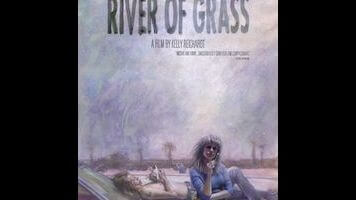The director of Old Joy made her debut with terrific outlaw saga River Of Grass

Over the past decade, Kelly Reichardt has emerged as one of American indie cinema’s finest directors, releasing a highly celebrated film (Wendy And Lucy, Meek’s Cutoff, Night Moves, the forthcoming Certain Women) every two or three years. To many, it may have appeared as if Reichardt launched her career with 2006’s terrific Old Joy, as she’d been missing in action for the previous decade-plus. Some cinephiles, though, spent those years impatiently waiting for her to follow up on the promise of her superb debut, River Of Grass, which premiered at Sundance in 1994 and received a tiny theatrical release the following year. The film never quite developed a real cult following, but it was singular enough to ensure that fans remembered Reichardt when she finally resurfaced. Now, Oscilloscope Films, with the help of some Kickstarter backers, have restored it and are re-releasing it in theaters (with a Blu-ray edition presumably to follow), giving audiences who missed it the first time around a chance to see how she started out.
Is there such a thing as a retroactive artistic departure? For all the obvious talent it displays, River Of Grass doesn’t much resemble Reichardt’s subsequent work, which is notable for its stillness and patience. At one point, early on, the action is cut to a frenetic drum solo, played by a cop (Dick Russell) who keeps a kit in his house and uses it to thrash out his frustration. In this particular instance, the cop is concerned because his adult daughter, Cozy (Lisa Bowman), has gone missing, and there’s evidence to suggest that she was involved in a shooting, though nobody was hurt. Cozy, however, believes that she accidentally killed a man, and she’s now “on the run” with Lee (Larry Fessenden), a stranger she’d met in a bar after he nearly ran her over on the highway. Those scare quotes are necessary because neither Cozy nor Lee has any money, so they never actually manage to leave town; they spend most of their time holed up in a cheap motel, for which Lee tries to scrape together the cash by selling his mother’s record collection.
Reichardt has Bowman—a compellingly blunt screen presence who’s barely acted since—narrate the movie in a folksy whisper that’s clearly meant to echo Sissy Spacek’s Badlands voiceover, and River Of Grass initially seems to belong to the same outlaw-lovers-on-the-lam genre. Cozy and Lee never develop any sort of romantic or even sexual attraction, though, and they haven’t actually committed any serious crime (which Lee soon discovers, choosing not to tell Cozy in order to prolong their adventure). Reichardt subverts expectations at every turn, while simultaneously painting a vivid portrait of southern Florida (the title refers to the Everglades, and the film goes back and forth between Broward and Dade County) in all its sun-drenched seediness. She gets an invaluable assist from Fessenden, a notable director in his own right (Wendigo, The Last Winter); he co-edited River Of Grass in addition to co-starring, and his jumpier sensibility, both onscreen and off, blends with Reichardt’s observational instincts in fascinating ways. If one were to watch this jagged, restless movie with no knowledge of who made it, guessing that it sprung from the same mind that created Old Joy or Meek’s Cutoff would be impossible. Intuiting that this gifted novice filmmaker would go on to bigger and better things, however, would be child’s play.